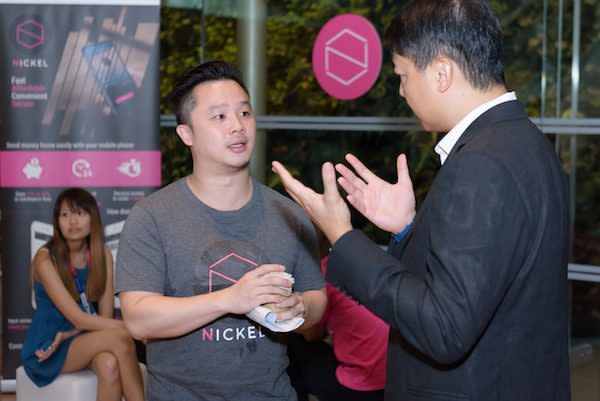Nickel: changing the remittance game for individuals and SMEs

If you have ever had to transfer (or remit) money overseas as an individual, you would know the pains of doing so.
The conventional way for many migrant workers here in Singapore would involve them heading to one of the many remittance outlets located in places such as Lucky Plaza or City Plaza.
And depending on the legth of the queue, it could be hours before it comes to their turn. This scenario is repeated throughout practically all countries that have a large migrant workforce.
But the time-consuming aspect of the traditional process is not the only sticking point. Another pain-point is the fact of having to carry around actual physical cash, which runs the risk of being misplaced, or even stolen.
In order to improve the overall experience and efficiency, several fintech start-ups have stepped into this arena with the aim of disrupting the lucrative remittance market.
One of these start-ups is Nickel.
Introducing Nickel

Source: The FinLab
Nickel is in the business of money transfers and foreign exchange (FX) using cryptocurrencies and blockchain technology.
It started off by doing remittance for migrant workers as a proof of concept using bitcoins.
It built a mobile app that allowed users to make remittances from Singapore to Indonesia by paying the amount they wished to transfer at any UOB cash deposit machines.
“We were also working towards allowing for cash transactions at all 7-11 outlets,” says Liam Julien Lin, the CEO and co-founder of Nickel.
“Once the money has been transferred, we do a transaction using bitcoins. Essentially, we buy and sell bitcoins, but when we sell, it’s for Indonesian Rupiah and that will be deposited into the recipient's bank account. That was what we initially started as,” he explains.
However, since then, Nickel has pivoted towards a B2B (business-to-business) approach.
“We realised that issues, such as price points, the time taken for the recipients to receive the money and the convenience factor faced by migrant workers while sending money are multiplied several folds when it comes to SMEs,” he shares.
Migrant workers pay relatively high fees to send money home. They typically spend about S$10-S$20 as remittance service fees and an additional 1% of FX charges just to send S$300 back home.The intended recipients will usually receive the funds after 2 to 3 days.
And if they want express delivery, they would have to top up S$2-S$3 more.
For SMEs however, when they do a transfer, they would typically pay a S$40 flat fee, 1%-1.5% in FX charges and sometimes the receiving bank may also charge a processing fee.
“This can end up to be quite substantial for the companies,” Liam adds.

Source: The FinLab
At Nickel, migrant workers were charged a flat S$8 fee along with 0.5% FX charges to send money home.
On the SME side, Nickel doesn’t charge a transaction fee, but they do impose the 0.5% FX charges above the interbank quoted rates.
“Right off the bat, the SMEs will get to save up to 4 times in FX charges,” Liam says. The best part is that Nickel offers unparalleled rates in the market.
“Last we checked, we were doing 1% better than XE and we can perform single transactions of up to S$100,000,” he says.
SMEs typically would not have access to such rates.
However, Liam admits that the rates aren’t always consistent due to lack of liquidity. This is something Nickel is working hard to fix.
Bigger dreams in the pipeline

Source: Thinkstock/Getty Images
“That is why we are embarking on a new project to get a consistent rate source – we want to create our own currency exchange on a blockchain – and allow us to move volumes beyond S$100,000,” the ex-investment banker continues.
“You will be able to trade the US Dollar and Singapore Dollar against five Southeast Asian currencies – Malaysian Ringgit, Philippine Peso, Indonesian Rupiah, Vietnamese Dong and Thai Baht,” he adds.
Nickel is currently in discussions with UOB for them to act as the central clearing bank and the central counterparty for all transactions.
Most FX trading is still done over-the-counter. When it comes to trading, usually a trader at an institutional level will have 5 to 6 preferred counterparties to trade with.

Source: Thinkstock/Getty Images
Also, trades typically happen only between counterparties that have established relationships. These can take months to build.
“We are developing a relationship with UOB to leverage on their connections with local banks in the respective countries to be the rate contributors as they are able to offer lower FX rates,” Liam explains.
This way, anyone can trade so long as they have a UOB trading account. “You just need to get on our platform and open a trading account with UOB if you don’t already have one.
So, just one negotiation with UOB, instead of negotiating with several onshore banks. And the rate sources will come from these partnering local banks.”
Nickel’s main goal now is to make FX trading simpler for corporate companies. “On our platform, corporate companies can trade with other corporate companies directly, with UOB acting as the central clearing bank,” he says.
“Sometimes corporate companies may need to offload some FX and through this platform, we can help match the companies.”
What’s next for Nickel?

Source: Thinkstock/Getty Images
In the not-too-distant future, Nickel plans to offer short tenure derivatives, like one-month forwards and call-and-put options through onshore banks. This is mostly for trade hedging purposes, as derivatives in Asia aren’t very liquidised.
Nickel also plans to offer exotic pairs, which the onshore banks can easily accommodate.
Right now, they are focusing on building this currency exchange called NickelX (or NiX for short) to allow their future corporate clients to enjoy close to or better than interbank rates.
As the trading volume grows on this platform NiX will become the market for Southeast Asian currency trading. And through this process, Nickel will take a small trading fee per transaction.
“We have plans in place for crypto-currency to future-proof our business. And once the crypto-currency market improves, it can then be used as an alternative source,” Liam adds.
Will it be a total monopoly?

Source: Thinkstock/Getty Images
The FX platform will be the first of its kind and with the model that Nickel adopts, it would be hard for other players to enter the playing field.
It may not be a total monopoly down the line but for the time being, Nickel is the only start-up creating its own currency exchange using this approach.
“We choose to go with a central clearance system as it lowers risk and it has the lowest overlapping counterparty risk model. UOB as our counterparty is present in so many countries in Southeast Asia and this gives us the advantage,” says Liam.
The FinLab advantage

Source: The FinLab
It was through The Finlab that Nickel gained invaluable access to UOB. “I think without The FinLab, we would never have had the opportunity to work this closely with a bank,” Liam admits.
“The FinLab has also given us the opportunity to speak with a lot of regulators from around the region. We are currently in discussions with a group of regulators from APAC,” he adds.
Liam himself just returned from Jakarta, where UOB helped arrange a meeting with the fintech association in Indonesia. Since most start-ups there would have to go through them, this was an essential connection for Nickel.
“Since UOB prides itself as an SME bank, it only makes sense for us to partner closely with them as we complement their business strategy in Southeast Asia,” Liam adds. “We believe we can help them grow their corporate business in FX by having us on board.”
(By Sarah Voon)
Related Articles
- Payment with benefits: CardUp’s game-changing product
- Legally bound: E-signing on the dotted line with Attores
- 5 expert tips to be the best fintech startup in Asia

 Yahoo Finance
Yahoo Finance 
